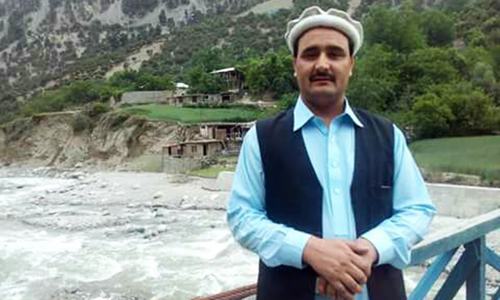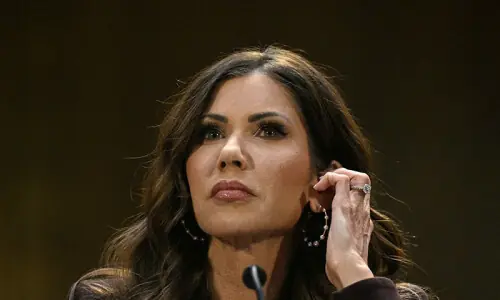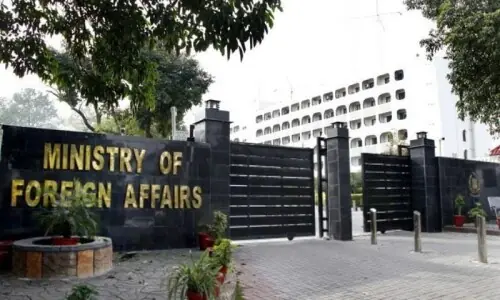Late Monday night, Wazirzada, the Kalash hopeful for a minority seat in the Khyber Pakhtunkhwa Assembly, sat at the house of Shahigul, a social worker in Bamborat who leads the women association in her village. Around them were gathered people from the Kalash community who cheered and clapped when Shahigul brought out a feather to put in Wazirzada’s Chitrali pakol. The feather was dyed half red, the other half green — colours of his party, the Pakistan Tehreek-i-Insaf. Amid much excitement, folks at the community assembly — the last that night at Bamborat, one of the Kalash valleys, where Wazirzada had gone electioneering — took turns to take pictures with Wazirzada.
“Can you hear them laughing?” said Wazirzada on phone from Bamborat, through brief interludes in conversation as he posed for pictures. “They are so happy. I don’t have words to describe their joy.”
While on surface an occasion warranting enthusiasm that voters might feel anywhere over their representative contesting elections, the Kalash community’s celebration of Wazirzada’s nomination as a PTI candidate for a minority reserved seat is much more. It is indicative of release from the deep sense of alienation the Kalash have always felt as the country’s smallest ethno-religious group.
“Perhaps they feel that for the first time they have become ‘complete’ Pakistanis,” says Wazirzada, explaining the “extraordinary” community reaction to his nomination.
Identity politics is at the heart of the Kalash’s struggle for rights. Wazirzada, a social activist with a master’s degree in political science, personifies the hope to take that struggle to mainstream politics, something that the community has been long denied. The fact that the community boycotted the 2013 elections only to relent when local politicians promised to look into their problems says something about its sense of deprivation, reinforcing the “otherness” of the Kalash people.
“They said our problems would be resolved on a priority basis but at the eve of yet another election, we find ourselves facing the same issues,” says Luke Rehmat, a Kalash social worker. A close associate of Wazirzada, Rehmat has been in the forefront of the struggle for a separate identity for the Kalash people.
On the face of it, the Kalash’s problems as a minority group are similar to others that fall in the same category. Apart from poverty and the paucity of opportunities — education, health, employment — there are grave concerns about forced conversions and faith-based curriculum for the Kalash children, forced to study religious books meant for the dominant majority. But when seen in the light of Unesco’s “Indigenous Community” status — a community existing only in Pakistan, with a population of 4,000 people living under the threat of extinction — their predicament acquires a grim immediacy.
When the community speaks of issues like conversion, it speaks warily if at all, soft-pedalling their opinion with caution. They choose to eulogise the majority that threatens them — for letting them live in peace and harmony. The Government Kalasha Schools in the valleys, an education initiative started by PPP’s Zulfikar Ali Bhutto, that were meant for Kalash children, with Kalash teachers and Kalash studies have yet to achieve that purpose.
“There are no Kalash teachers but Muslims, no Kalash studies but Islamiyat,” says Dr Innayatullah Faizi who heads the Chitral Model College in the city.
The state’s refusal to grant them an ethno-religious identity separate from other groups such as the Christians, Hindus and Sikhs acts both as a catalyst and a compounder, ensuring sustained absence of rights. In the 2017 census, for example, the form didn’t have a field specific to the Kalash. The community went to the Peshawar High Court against the census form giving them no identity. The PHC upheld their claim but the Census Division challenged the verdict in the Supreme Court instead of giving them that right.
‘Buddhists, others’
In the birth certificate, they are “Buddhists.” In passports, they are a nameless “others”. Come 2018, and the community is at the cusp of another elections without an identity of its own.
“I was supposed to attend a United Nations conference but was refused American visa because at the embassy they didn’t know where I fit as a citizen of Pakistan,” says Wazirzada, whose politics are shaped by his community’s struggle for identity. Until the year 2002 when the Musharraf government included the Kalash under “scheduled castes”, he says, the community didn’t even know there was a minister for minorities representing them. Soon after he left the university, he went to see the minister to apprise him of the community’s concerns. “The minister told me he didn’t get my vote to make it to ministry and was, therefore, not obliged to help us.”
The incident left Wazirzada — still young to contest elections but respected for his rights-based activism — determined to lobby and get Nabeg, a Kalash lawyer, nominated for a reserved seat in 2008 elections under the banner of PPP-Sherpao — now Qaumi Watan Party. He says 80 per cent of the Kalash votes went to Nabeg, despite PPP-Sherpao’s weak standing as a political entity in Chitral, encouraging Wazirzada to take the plunge himself as a PTI candidate in the 2013 elections. In terms of priority, he was the fourth candidate in the reckoning and didn’t make it to the assembly. But the fact that he was considered at all made his nomination compelling in symbolism, if not substance. In 2018 elections, he is the second priority for the reserved seat.
“No other party considered a Kalash representative,” says Wazirzada. “It is a big achievement considering that 28 people from different religious minorities applied for the seat and those selected have no money and influence. It doesn’t matter whether I become an MPA or not. Even if it doesn’t happen, other parties will consider Kalash candidates because our cause has been elevated to mainstream, our efforts recognised.”
To the Kalash community, Wazirzada’s rise as a political figure representative of his people is thrilling for the obvious reasons. But they also feel he deserves the attention he got from his party. After he gave up his LLB to pursue political ambitions, Wazirzada has been dedicated to the service of Kalash community. “He is energetic, dedicated to social work and community welfare,” says Rehmat.
Published in Dawn, June 28th, 2018
































